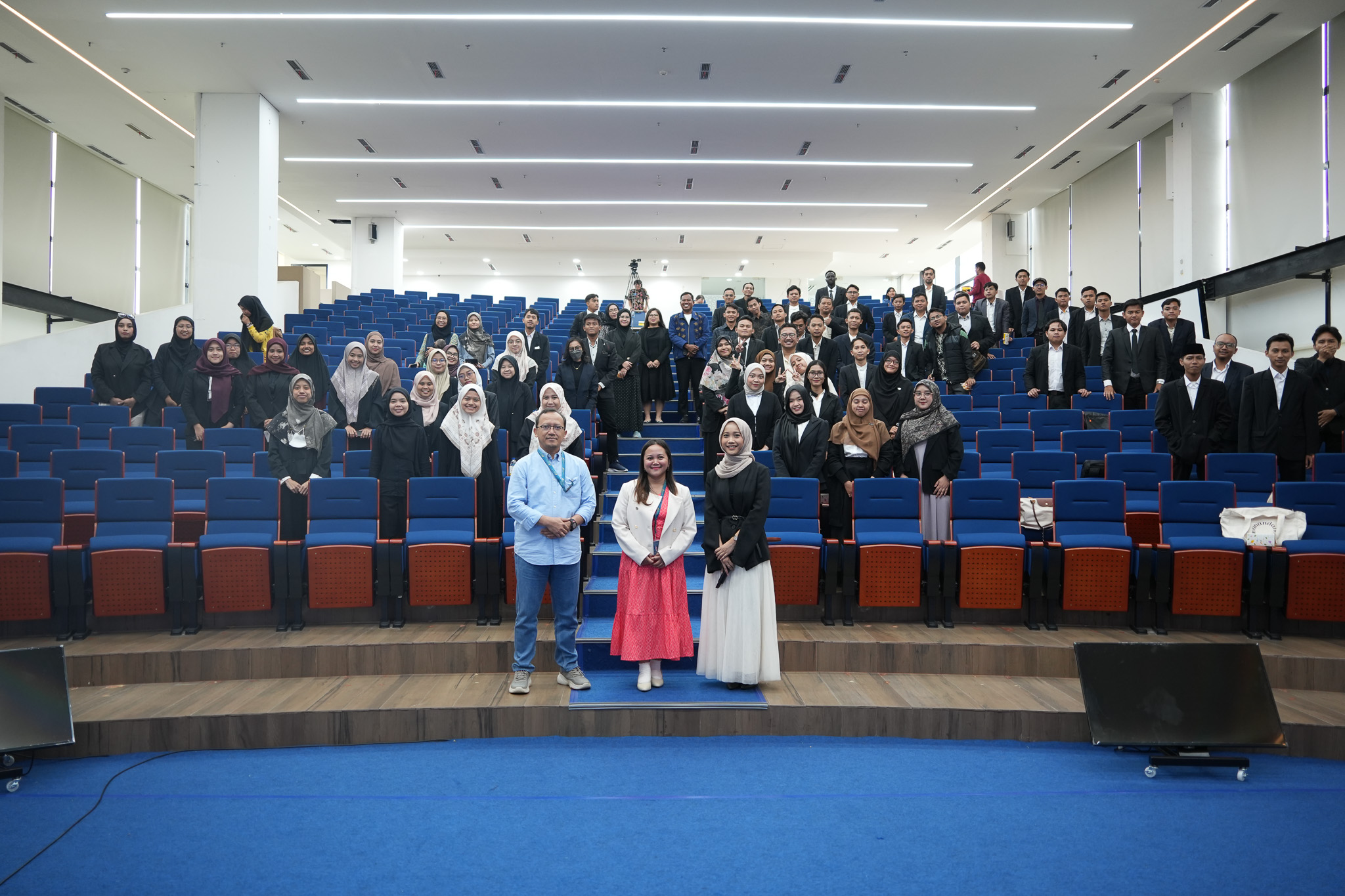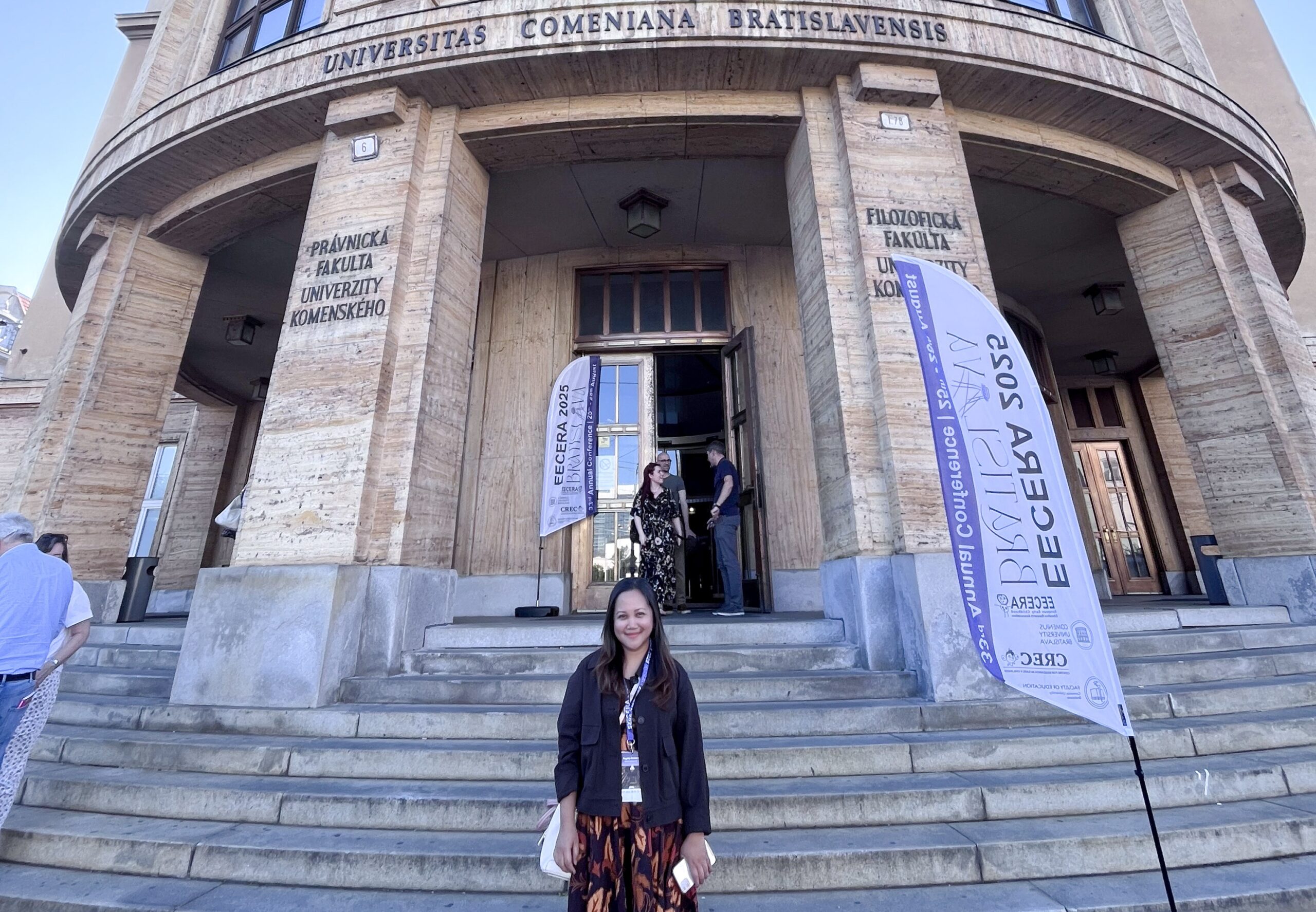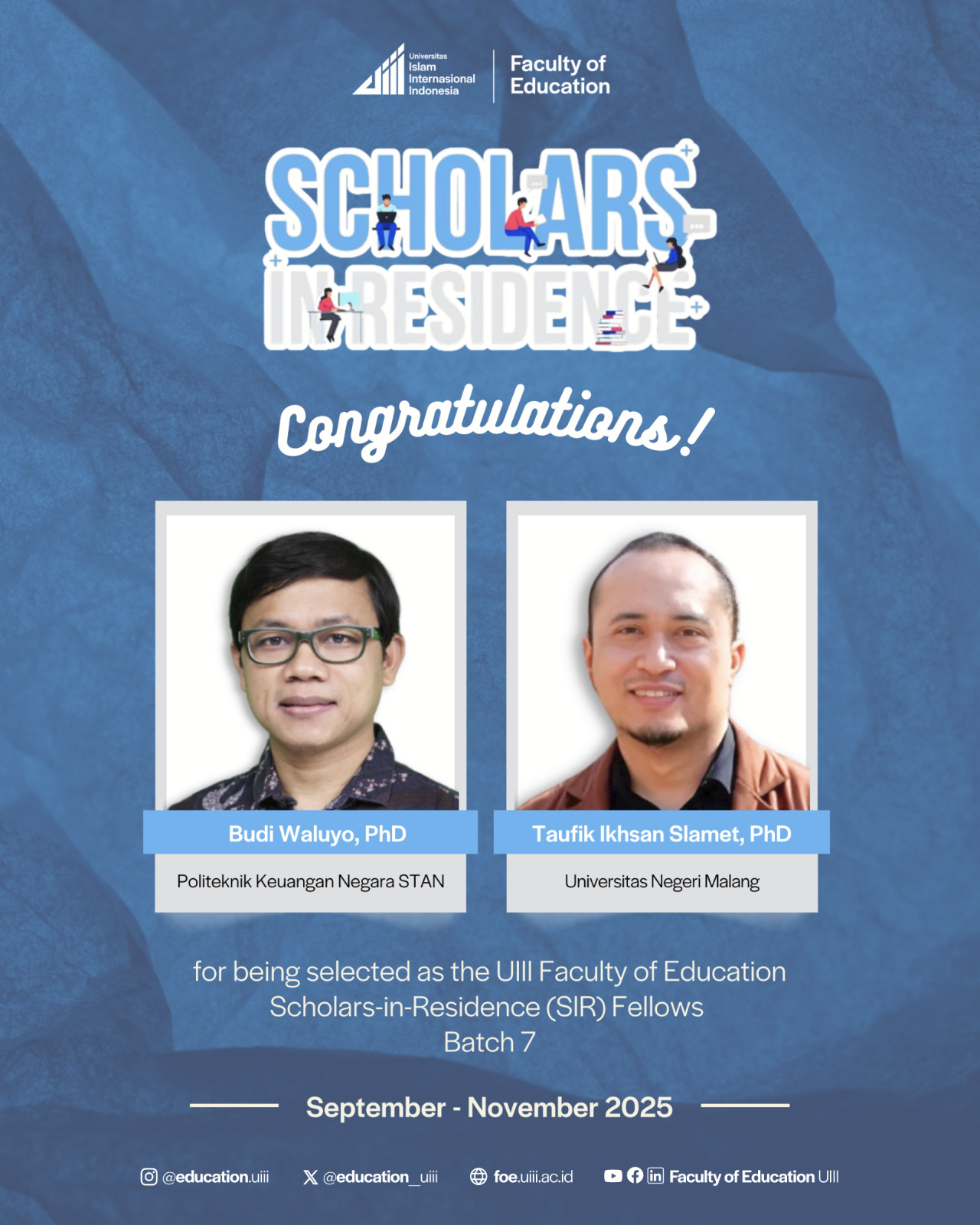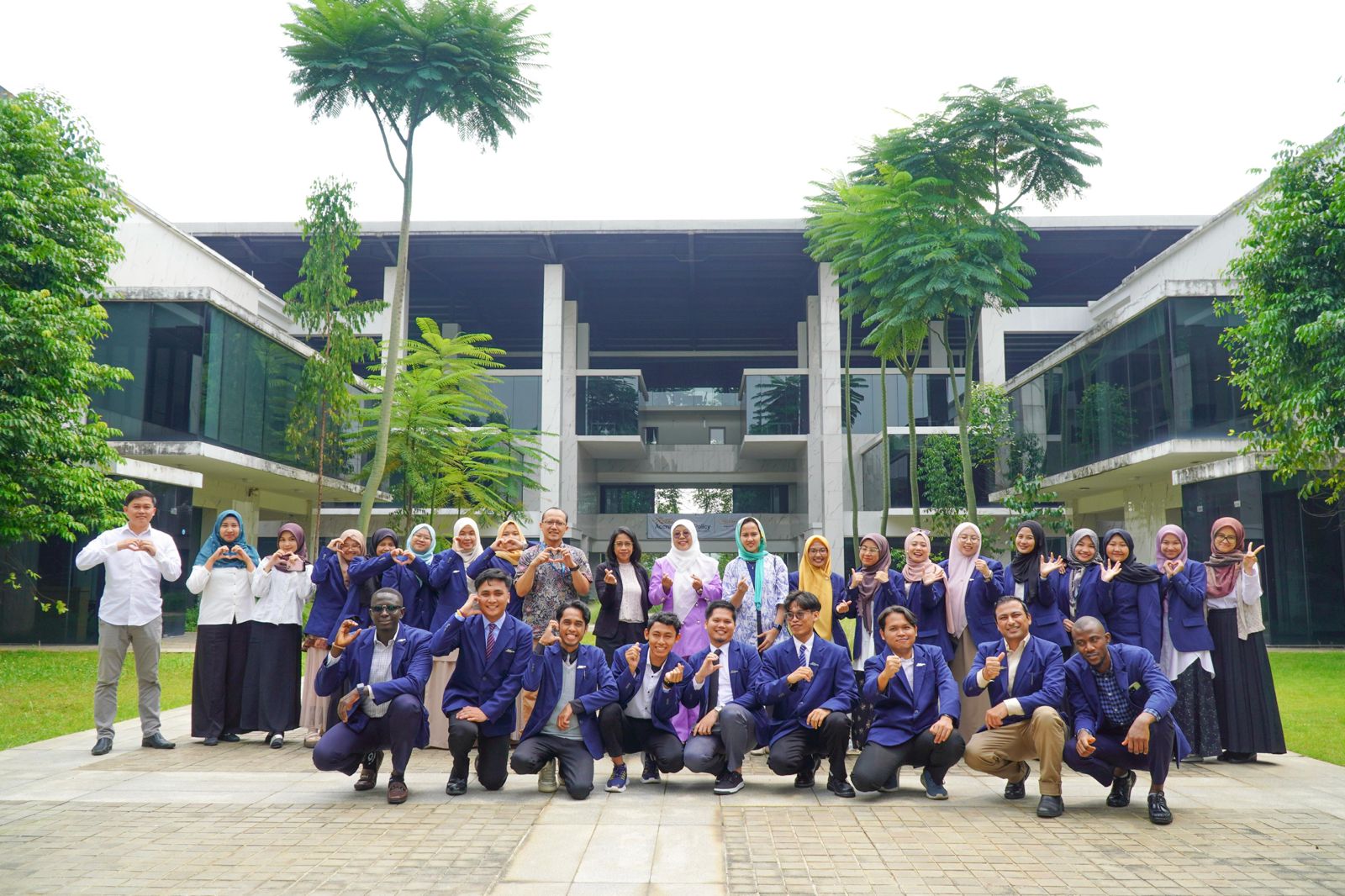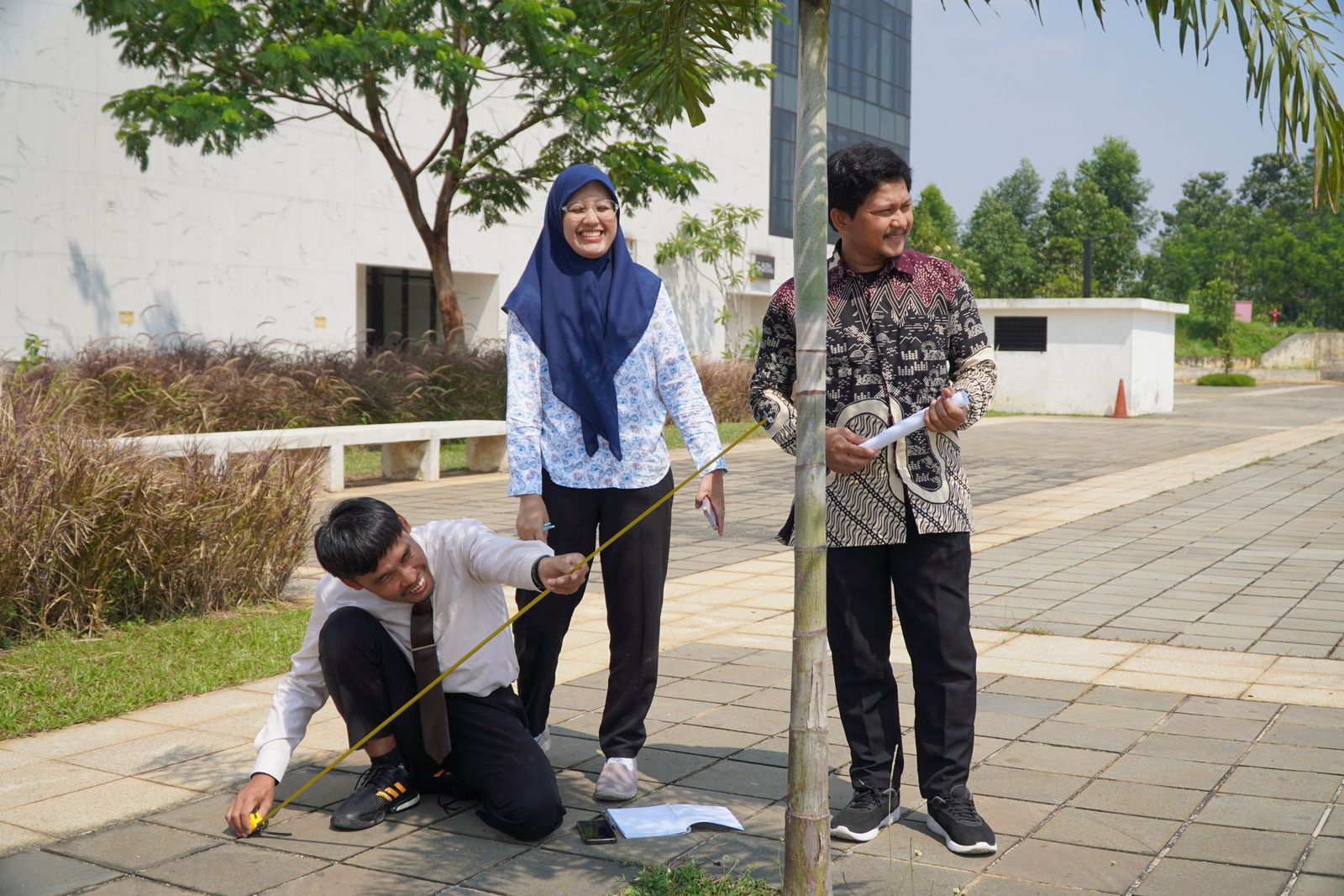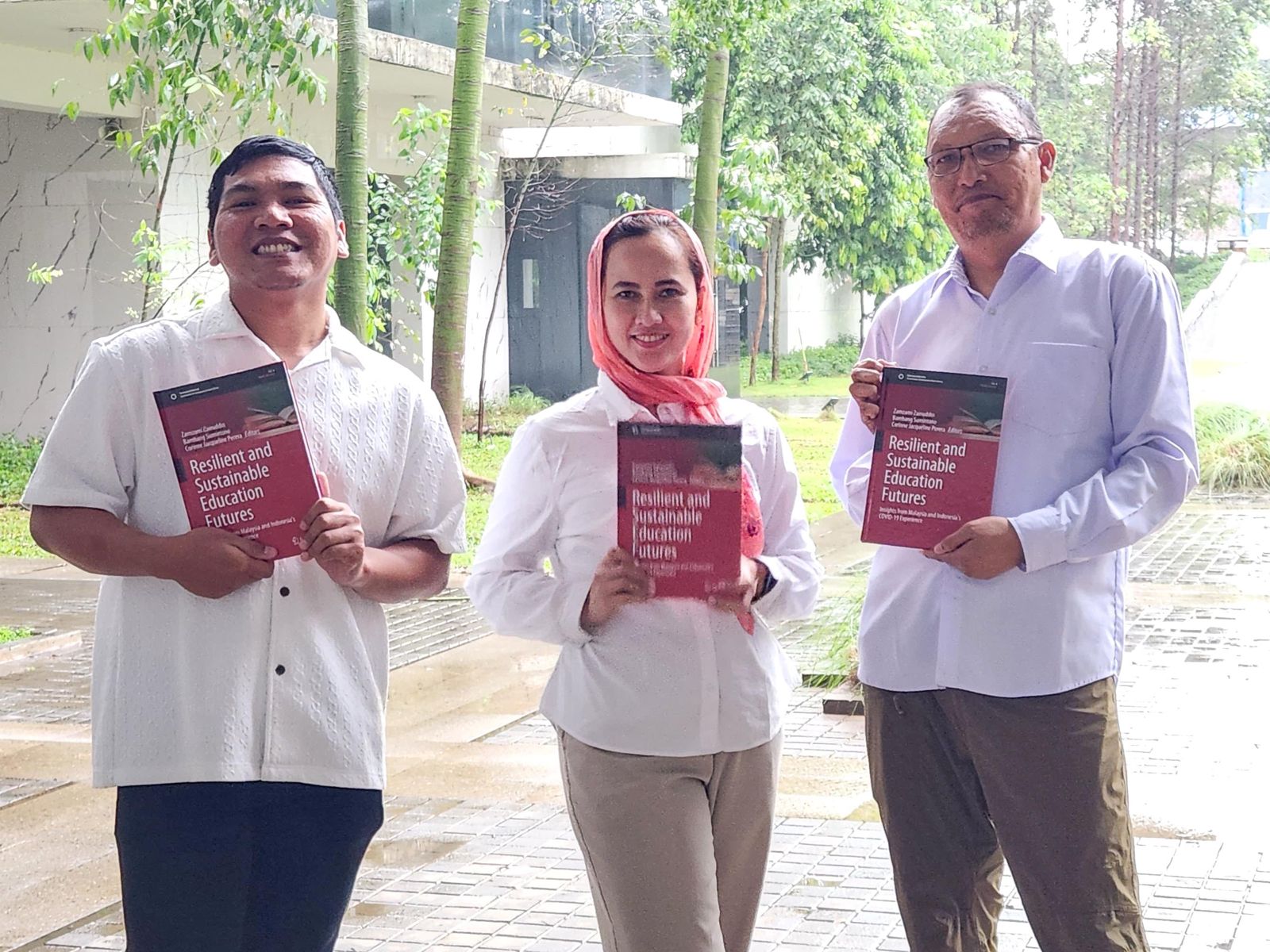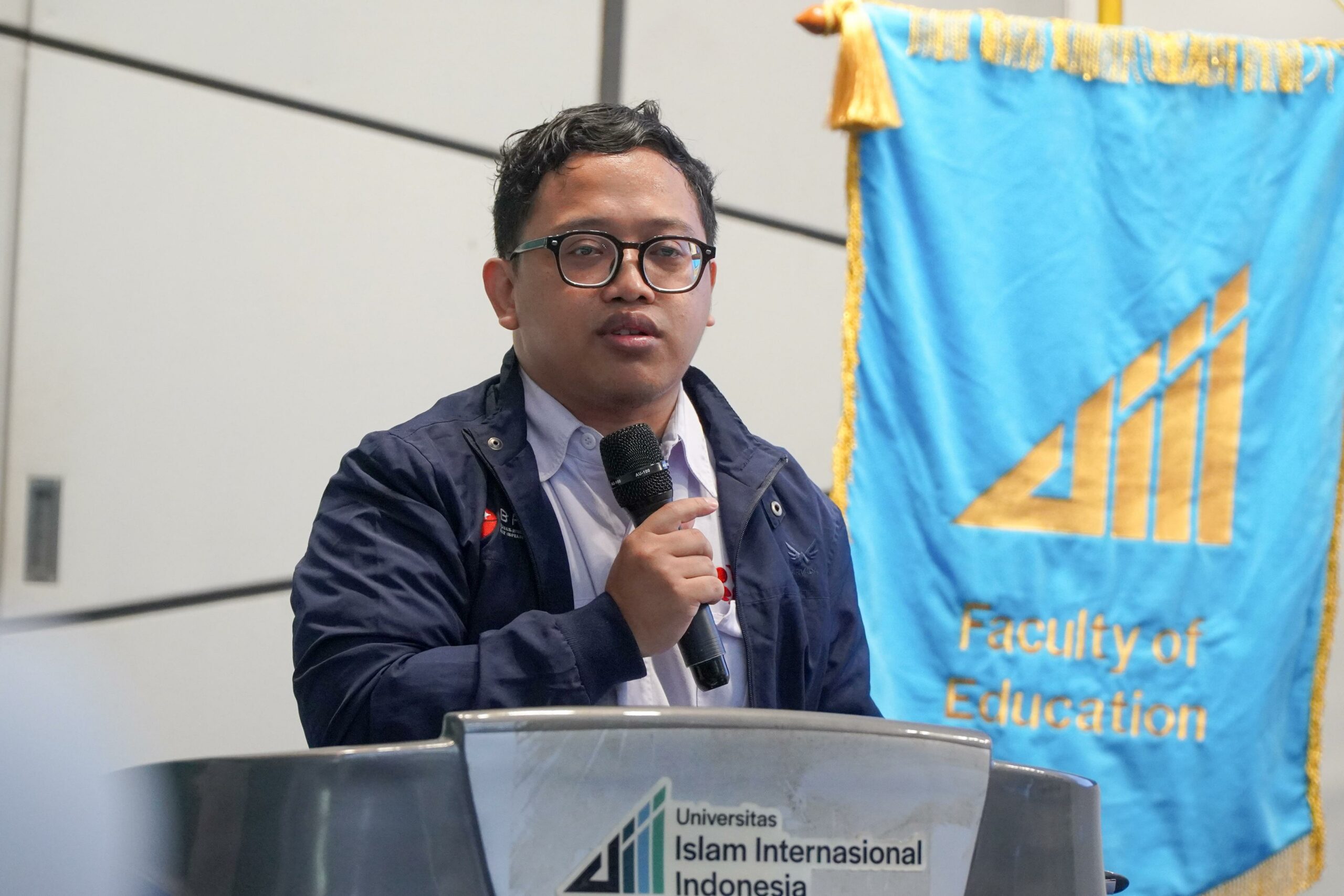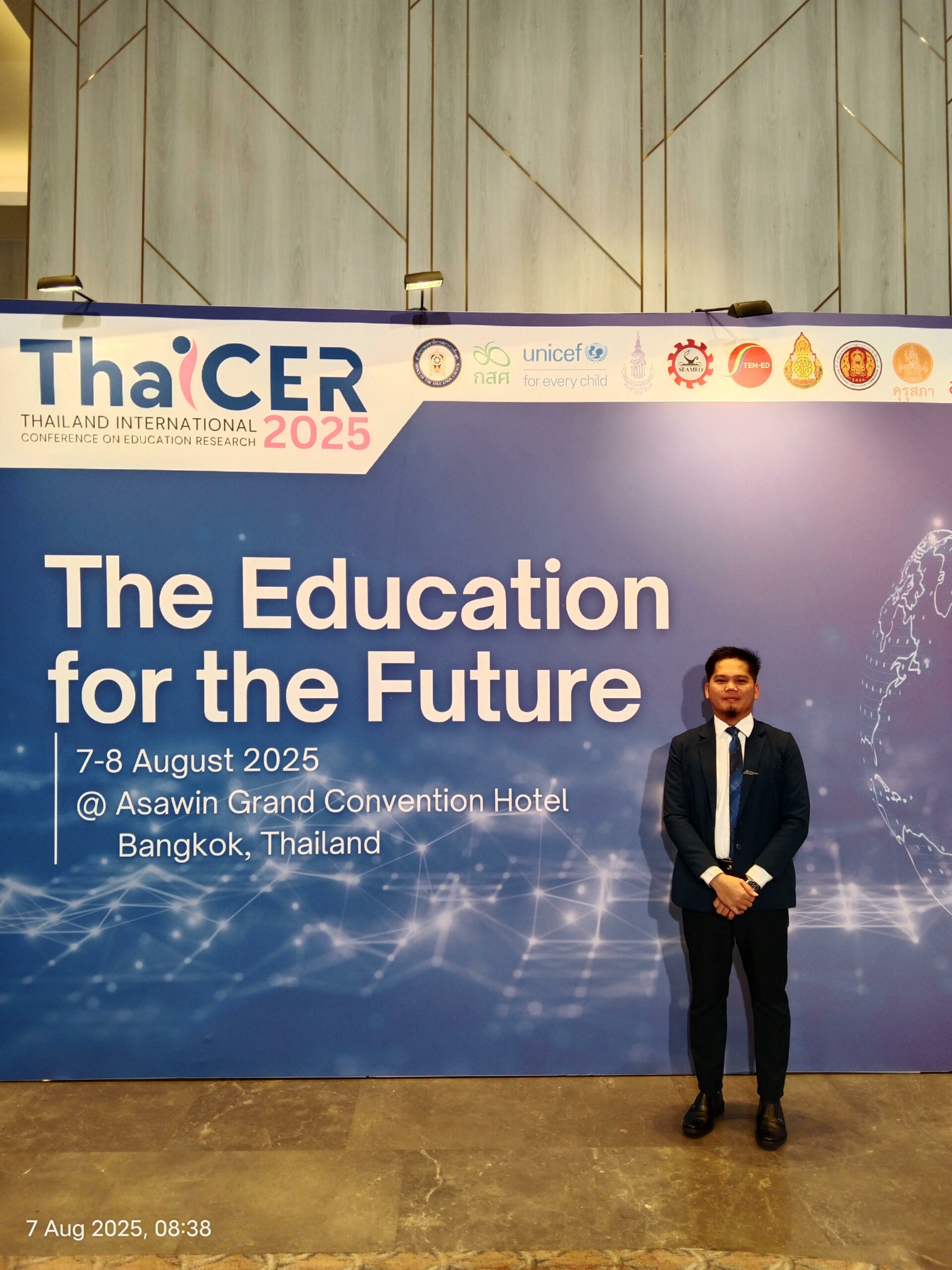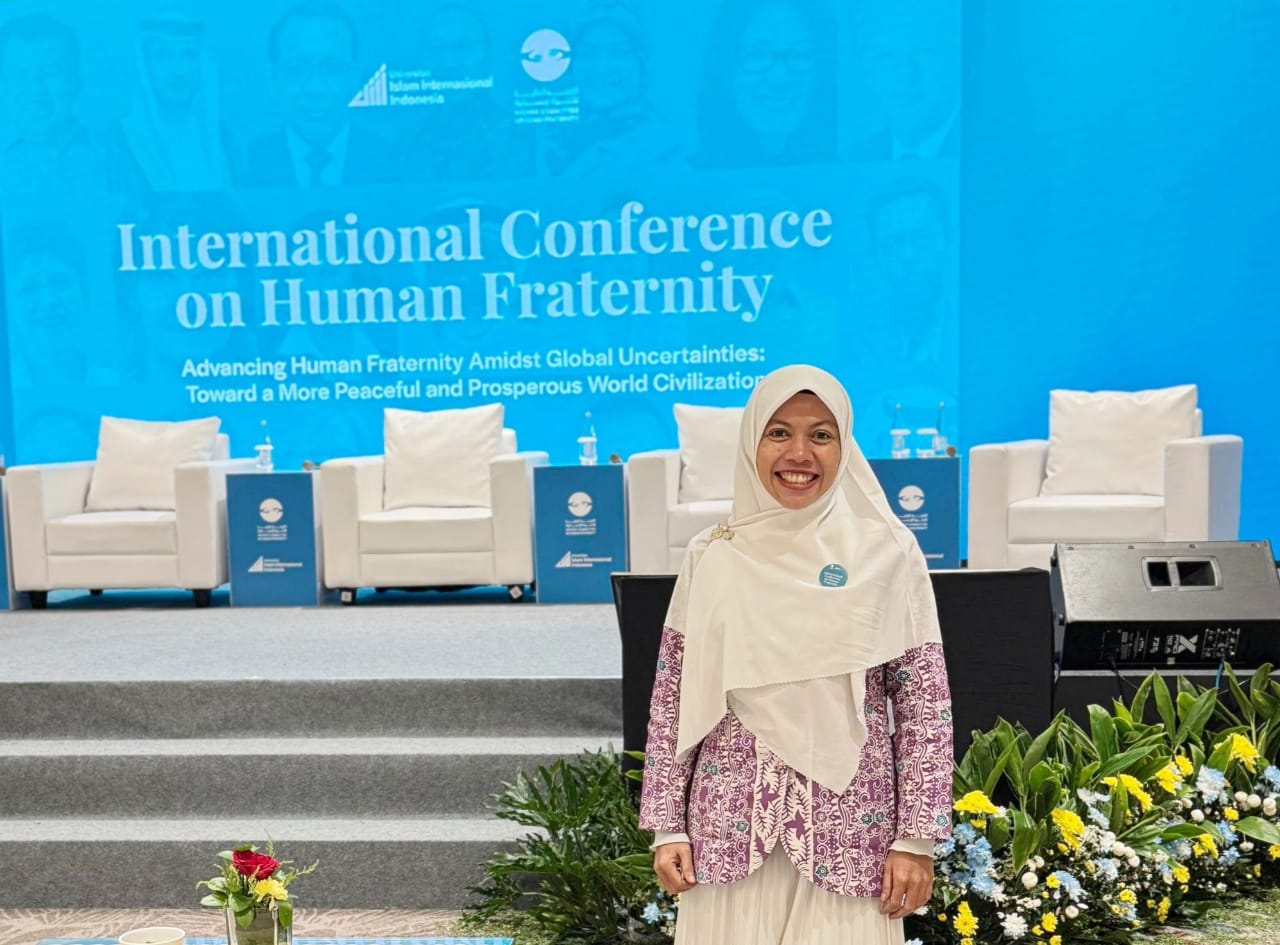Meet the Guardians of Wellbeing at UIII: Introducing the Counseling and Mental Health Services (CMHS)

Meet the Guardians of Wellbeing at UIII: Introducing the Counseling and Mental Health Services (CMHS)
September 23, 2025
Contributor: Supriyono | Editor: Dadi Darmadi | Photo: Achmad Jatnika
The journey of postgraduate study is often spoken of in bright terms—academic achievements, inspiring intellectual discussions, and promising futures. Yet beneath that surface, the lived reality can be far tougher. Endless assignments, the pull of family responsibilities, financial pressures, and the loneliness of being away from home can leave students quietly overwhelmed.
However, here at Universitas Islam Internasional Indonesia (UIII), we care about you, your mental health, and your overall wellbeing. Closing this year’s Orientation Week (O-Week) on Friday, September 19, 2025, two faculty members from the Faculty of Education—Dr. Lukman Nul Hakim and Assoc. Prof. Charyna Ayu Rizkyanti—addressed new students on an often-unspoken yet critical issue: mental health and counseling.
The session specifically introduced UIII’s Counseling and Mental Health Services (CMHS), a division under the university that provides psychological services. This unit is designed as a safe and inclusive space that respects diversity in culture, gender, and individual backgrounds. The service is open to all members of the academic community—students, faculty, and staff.
“Our approach is promotive, preventive, curative, and rehabilitative,” said Dr. Lukman, the Chair of CMHS. “We run mental health campaigns, psychoeducation sessions, and screenings; provide individual and group counseling; and connect students to external services when needed.”
The counseling services are located at the Faculty of Education in the Faculty A compound (first and third floors). They are available during working hours, and students, staff, and faculty members can access them by booking an appointment through the CMHS application. “Seeking help is an act of courage, not a sign of weakness. So never hesitate to reach out to us—we are here to support you,” Dr. Lukman said.
Meanwhile, Assoc. Prof. Charyna emphasized what these services mean in the day-to-day reality of student life. “We know that postgraduate study is hard, but it is not meant to break you,” she said. “The pressure of assignments, the personal struggles, even the loneliness—they can feel overwhelming. But these challenges are also opportunities to discover your strength and resilience. What matters most is that you don’t go through them alone, because here at UIII, we care about your wellbeing.”
She added that that well-being is not about avoiding challenges, but about how we respond to them. “When you can maintain your well-being, all those challenges can be accepted and understood as part of your life. You may feel sad, but you don’t stay in sadness; you may feel despair, but you still keep moving forward. If you are in that state, it means you are flourishing. You don’t only survive, but you thrive—growing, enjoying the process, and living with meaning.”
At UIII, we believe that academic success and personal well-being go hand in hand. By providing accessible counseling services, supportive programs, and a community that truly listens, we strive to ensure that no student walks this journey alone. Because here, your mental health matters just as much as your academic achievement.

UIII Scholars Share Groundbreaking Research at the 33rd EECERA Annual Conference in Slovakia

UIII Scholars Share Groundbreaking Research at the 33rd EECERA Annual Conference in Slovakia
September 2, 2025
Contributor: Supriyono | Editor: Dadi Darmadi | Photo: Charyna Ayu Rizkyanti
Bratislava, Slovakia — Two representatives from UIII brought fresh insights on empathy, wellbeing, and diversity in early childhood education (ECE) to the global stage at the 33rd Annual Conference of the European Early Childhood Education Research Association (EECERA), held from August 25–28, 2025, at the Faculty of Arts, Comenius University, Bratislava.
Assoc. Prof. Charyna Ayu Rizkyanti, lecturer at the Faculty of Education, and Syifa Mufiedatussalam, a PhD candidate at the Faculty of Education, joined hundreds of international scholars at this year’s event, themed “Early Education for All: Celebrating Diversity and Seeking Inclusion.”
Assoc. Prof. Charyna presented two of her recent studies across different symposium sessions, namely Symposium Set A themed ‘Children’s Behaviour and Teacher Empathy’. Held on August 26, 2025, she delivered a presentation titled “Striking the Right Balance: How Empathy Shapes Gen Z Early Childhood Teachers.”
 The next day on August 27, 2025, Assoc. Prof. Charyna presented at the Symposium Set E themed ‘Teacher Empathy, Emotions, and Expectations’. In this session, she delivered a compelling topic of “Valuing Diversity in ECE through Teacher Empathy: A Mixed-Method Study”, a collaborative project she conducted with Popi Rosepti, an UIII alumna from the first-batch MA student at the Faculty of Education.
The next day on August 27, 2025, Assoc. Prof. Charyna presented at the Symposium Set E themed ‘Teacher Empathy, Emotions, and Expectations’. In this session, she delivered a compelling topic of “Valuing Diversity in ECE through Teacher Empathy: A Mixed-Method Study”, a collaborative project she conducted with Popi Rosepti, an UIII alumna from the first-batch MA student at the Faculty of Education.
Meanwhile, Syifa Mufiedatussalam presented her doctoral research under Symposium Set F themed ‘Teacher’s Wellbeing’ on August 27, 2025. Her presentation was titled “How well are you, dear early childhood teacher?” Her presentation highlighted the pressing importance of supporting teacher wellbeing as a foundation for inclusive and high-quality early childhood education.
Both presenters received strong appreciation from participants and opened doors for international collaboration, including book projects, joint research, and academic partnerships with institutions across Europe and beyond.
Beyond paper presentations, Assoc. Prof. Charyna and Syifa engaged in active networking with global experts. They had the opportunity to meet directly with Prof. Dr. Christine Pascal, OBE, President of EECERA, and Prof. Dr. Tony Bertram, Editor-in-Chief of the European Early Childhood Education Research Journal (EECRJ). Discussions also explored the possibility of Assoc. Prof. Charyna serving as an EECERA country coordinator for Indonesia and contributing as a reviewer for EECRJ, a leading SSCI-rated journal.
Reflecting on their participation, the UIII delegation expressed hope that their contributions will strengthen Indonesia’s voice in international academic conversations on early childhood education. “We believe our work can support broader efforts to advance inclusive, empathetic, and sustainable practices in ECE,” said Assoc. Prof. Charyna.
 The EECERA Annual Conference, recognized as one of the largest gatherings of early childhood education researchers worldwide, continues to serve as a vital arena for dialogue, critical inquiry, and collaboration. This year’s theme underscored the urgency of building educational systems that embrace diversity, support teacher wellbeing, and uphold the rights of every child.
The EECERA Annual Conference, recognized as one of the largest gatherings of early childhood education researchers worldwide, continues to serve as a vital arena for dialogue, critical inquiry, and collaboration. This year’s theme underscored the urgency of building educational systems that embrace diversity, support teacher wellbeing, and uphold the rights of every child.
Scholars-in-Residence (SIR) Fellows Batch 7, Faculty of Education UIII

Scholars-in-Residence (SIR) Fellows batch 7, Faculty of Education - UIII
The Faculty of Education is delighted to introduce and announce the result of the Scholars-in-Residence (SIR) Program (Batch 7 for September – November, 2025). Theya are: Budi Waluyo, PhD (from Politeknik Keuangan Negara STAN) and Taufik Ikhsan Slamet, PhD (Universitas Negeri Malang). Both of them will be participated in many academic activities in the faculty, such as a guest lecturer in MA and PhD courses, giving seminar in Lunch Talk series, open for discussion and consultation for MA and PhD students in the faculty, as well as in social activities too. Welcome Pak Budi and Pak Taufik.
164 Graduates, 18 Countries, One World: The 3rd UIII Commencement Ceremony

164 Graduates, 18 Countries, One World: The 3rd UIII Commencement Ceremony
August 27, 2025
Contributor: Supriyono | Editor: Dadi Darmadi | Photo: Achmad Jatnika
Depok, 27 August 2025 – Universitas Islam Internasional Indonesia (UIII) proudly held its third commencement ceremony, celebrating the graduation of 164 students from 18 different countries, marking another milestone in the university’s growing global academic community.
This year’s graduates comprise 105 Indonesian nationals and 59 international students, reflecting UIII’s vision as a hub for international higher education. The Class of 2025 represents UIII’s truly international character, with graduates hailing from Indonesia, Afghanistan, Gambia, Yemen, Bangladesh, the Philippines, Kazakhstan, Ghana, Morocco, Nigeria, Pakistan, Egypt, Sudan, Uzbekistan, Tanzania, Malawi, Kenya, and Thailand.
From the academic divisions, the graduates represent the Faculty of Islamic Studies (55), Faculty of Social Sciences (37), Faculty of Economics and Business (46), and Faculty of Education (26). Among them are 14 students of the Dual Degree Program—8 with the University of Edinburgh and 6 with SOAS University of London—demonstrating UIII’s strong international partnerships.
In his commencement address, Prof. Jamhari, Rector of UIII, congratulated the graduates and emphasized the significance of their achievements. “Today is not only a celebration of academic success but also a testimony to the international spirit of UIII. Our graduates come from 18 countries, carrying with them the mission to contribute positively to their societies and to the global community. UIII stands as a bridge between Indonesia and the world, and you are the ambassadors of that mission.”
Dr. Phil. Syafiq Hasyim, Vice Rector for Academic Affairs, highlighted the role of UIII graduates in shaping the future of global education and leadership. “This commencement proves that UIII is steadily realizing its goal of becoming a world-class university. Our students have been trained not only with knowledge but also with values of inclusivity, dialogue, and humanity. As they return to their countries or continue their careers, we trust they will be change-makers who embody the vision of UIII.”
Since its first commencement in 2023, UIII has continued to expand its academic reach. The first batch in 2023 produced 72 graduates from 13 countries, followed by 88 graduates from 13 countries in 2024. With the addition of this year’s 164 graduates, UIII now proudly counts a total of 324 alumni from 27 countries worldwide.
The countries include Afghanistan, Algeria, Bangladesh, Cameroon, Egypt, Gambia, Ghana, India, Indonesia, Ivory Coast, Kazakhstan, Kenya, Malawi, Morocco, Nepal, Nigeria, Pakistan, Philippines, Somalia, Sudan, Tanzania, Thailand, Timor-Leste, Togo, Tunisia, Uzbekistan, Yemen.
The graduation ceremony this year was attended by ambassadors and representatives from several countries, including Afghanistan, Pakistan, Uzbekistan, Nigeria, Sudan, and the Philippines. Their presence highlighted the significance of the event and underscored the spirit of international friendship and cooperation.
Reflecting on UIII’s broader mission, Prof. Jamhari added: “UIII not only serves as an academic institution but also carries a diplomatic mission. I expect our graduates to contribute meaningfully in their respective countries while maintaining a strong bond with Indonesia in general, and with UIII in particular. Education has the power to unite people across differences, and UIII is committed to nurturing that unity.”
This consistent growth highlights UIII’s rapid development as a center of excellence. Since its establishment, UIII has emerged as a global hub of Islamic higher education, offering not only academic rigor but also a platform for international collaboration, cultural dialogue, and intellectual exchange that connects Indonesia with the wider world.
source: https://uiii.ac.id/164-graduates-18-countries-one-world-the-3rd-uiii-commencement-ceremony/
FoE Celebrates 2025 Judicium Ceremony, Honoring Best Graduate and Best Thesis Awards
FoE Celebrates 2025 Judicium Ceremony, Honoring Best Graduate and Best Thesis Awards
August 26, 2025
Contributor: Supriyono | Editor: Dadi Darmadi | Photo: Virda L. Umam
The Faculty of Education at Universitas Islam Internasional Indonesia (UIII) held its Judicium Ceremony on August 25, 2025, marking an important milestone for graduating students as they embark on the next chapter of their academic and professional journeys.
During the ceremony, two outstanding students were honored for their exceptional achievements. Muhamad Maulana was named Best Graduate with a perfect GPA of 4.00, reflecting his consistent dedication and academic excellence throughout his studies.

Meanwhile, Karamo Ceesay received the Best Thesis Award for his research titled “Exploring Parental Involvement in Student’s Academic Achievement: A Case Study of Public Primary Schools in Rural Gambia”, which earned an impressive score of 96.67.

Prof. Nina Nurmila, Dean of the Faculty of Education praised the graduates for their hard work and commitment. “This judicium is not just a celebration of academic success but also a testament to the resilience and passion of our students. We are confident that our graduates will continue to contribute meaningfully to education and society,” she stated.
The ceremony concluded with reflections on the Faculty’s vision to nurture globally competitive scholars and educators, reinforcing UIII’s commitment to advancing education rooted in academic rigor and social responsibility.
Math Meets Adventure: Teachers Turn Into Math Explorers at STEM Trails Workshop at UIII

Math Meets Adventure: Teachers Turn Into Math Explorers at STEM Trails Workshop at UIII
August 15, 2025
Contributor: Supriyono | Editor: Dadi Darmadi | Photo: Virda Lalitya Umam
What if we say that math lessons should not always happen in classrooms filled with formulas on the board? On Friday, 25 July 2025, a group of math teachers in Depok left their desks for the outdoors, turning the city into one giant problem-solving playground.
This workshop was called ‘STEM Trails with Socio-Scientific Issues’, hosted by UIII’s Faculty of Education in collaboration with Universitas Negeri Semarang (UNNES), Universitas Syiah Kuala (USK), and the Math Trails Lab community. It was part of the nationwide ‘Reset Kolaborasi Indonesia (RKI)’ project, which brings together 24 PTN-BH across the country to collaborate in comprehensive research.
The idea is simple but exciting: use MathCityMap (https://mathcitymap.eu/en/), a digital tool that transforms parks, streets, and public spaces into real-life math challenges. Participants learned to design tasks based on local socio-scientific issues—that can be problems rooted in societies, so students can connect math to real life.
“This project is our way of showing that math can be fun, relevant, and tied to the real world,” said Dr. Destina Wahyu Winarti, a lecturer at UIII’s Faculty of Education and lead organizer for the Depok session. “We want students to solve problems they can actually see, not just read about in a textbook. It is like throwing one stone and getting two birds—helping them understand math better while also raising awareness about issues that matter in their own communities.”
One of the guest speakers, Adi Nurcahyo from UNNES explained that MathCityMap was developed in Frankfurt, Germany, in 2013. “It’s about taking math outdoors with the help of technology,” he said. “We’ve built the Math Trails Lab to adapt it for Indonesia, so teachers, students, and even the public can join in. You might find math problems in a city park, a museum, or even a historic building.”
The workshop was not just about theory—teachers hit the field, completing math trails themselves. Novita Andriani from SMAIT Al Haraki said, “It was fun because we had to find task points in our nearby environment. We couldn’t work alone—we debated, corrected each other, and in the end, we solved the problems together.”
For Febriyansyah, a math teacher at SMP Pesantren Cendekia Amanah, the biggest wish is for the program to grow: “It’s amazing, especially with trainers from different regions. I hope we can bring it to more places, especially remote areas in eastern Indonesia.”
By the end of the workshop, one thing was clear—math doesn’t have to be boring. With the right tools, a little creativity, and a willingness to step outside, it can feel like an adventure.
UIII Faculty of Education Scholars Contribute to Springer Nature Book on Sustainable Education Futures

UIII Faculty of Education Scholars Contribute to Springer Nature Book on Sustainable Education Futures
August 14, 2025
Contributor: Supriyono | Photo: Bambang Sumintono
Several scholars from the Faculty of Education at Universitas Islam Internasional Indonesia (UIII) have published book chapters in “Resilient and Sustainable Education Futures: Insights from Malaysia and Indonesia’s COVID-19 Experience”, part of the international publisher Springer Nature Sustainable Development Goals (SDGs) Series.
The book was edited by Dr. Zamzami Zainuddin from the College of Education, Psychology and Social Work, Flinders University, Adelaide, Australia; Dr. Bambang Sumintono from Faculty of Education, UIII; and Dr. Corinne Jacqueline Perera from Shangrao Normal University, China.
The volume highlights innovative and impactful approaches to learning, showcasing how technology can make classrooms more engaging and enjoyable. Grounded in the post-pandemic education experiences of Malaysia and Indonesia, it offers empirical insights into the challenges and opportunities that emerged during COVID-19 in schools.
Serving as a practical resource for educators, researchers, and policymakers, it provides guidance on curriculum renewal, alternative assessment methods, teacher professional growth, student engagement, and inclusive pedagogies for marginalized communities, all in line with the global pursuit of sustainable education.
The book features multiple chapters authored by UIII faculty members. Dr. Bambang Sumintono co-authored “School Leadership Resilience During the COVID-19 Pandemic: Indonesian Experience”; “Islamic Leadership and School Resilience in Times of Crisis: Lessons from Indonesian Primary Schools Post-COVID-19 Pandemic” and “Reinventing Sustainable Learning in Malaysia and Indonesia: Lessons Learned from COVID-19.”
Meanwhile, Dr. Tati Lathipatud Durriyah was the lead author of “Navigating Teacher Agency: Implementing an Innovative Literacy Teaching Model in Indonesian Classrooms.”
Additionally, Supriyono also become the lead author in “School Digitalization Strategies in Non-strategic Settings: Insights from Islamic Boarding Schools in Rural Indonesia,” with contributions from two other UIII MA in Education graduates, Muhammad Numan and Muhammad Fayyaz Mumtaz. Supriyono also co-authored “Islamic Leadership and School Resilience in Times of Crisis: Lessons from Indonesian Primary Schools Post-COVID-19 Pandemic.”
Beyond UIII, the book also includes contributions from other Indonesian Islamic higher education institutions (PTKIN), featuring four chapters written by lecturers from UIN Syarif Hidayatullah Jakarta, and one chapter from UIN Walisongo Semarang and UIN Sunan Kalijaga Yogyakarta.
Reflecting on the publication, Dr. Bambang Sumintono noted that this collaborative work not only documents educational resilience during COVID-19 but also offers sustainable strategies for the future. “The pandemic challenged us to rethink education. This book captures the lessons and innovations that can inspire future practices,” he said.
This Springer Nature publication reinforces UIII’s growing scholarly footprint in global education discourse and showcases Indonesia’s contributions—UIII in particular—to building more resilient and sustainable education futures.
Click to visit link of the book: Resilient and Sustainable Education Futures: Insights from Malaysia and Indonesia’s COVID-19 Experience.
How to Use AI Ethically in Academic Writing? Insights from Dr. Soeharto

How to Use AI Ethically in Academic Writing? Insights from Dr. Soeharto
August 13, 2025
Contributor: Supriyono | Editor: Dadi Darmadi | Photo: Virda Lalitya Umam
For many academics, the idea of using Artificial Intelligence in research still feels like stepping into uncharted territory. Concerns about authorship, originality, and academic integrity often dominate the discussion. But for Dr. Soeharto, Scholar in Residence at UIII’s Faculty of Education, the conversation has already shifted from whether to use AI (or not) to how to use it ethically and responsibly.
Besides being Scholar in Residence at UIII’s Faculty of Educatio, Dr. Soeharto is also a researcher at Indonesia’s National Research and Innovation Agency (BRIN). He has published papers in leading academic journals, some of which were developed with the assistance of AI. Speaking to students and the academic community at LunchTalk #43 on July 22, 2025, he emphasized that before integrating AI into scientific writing, scholars must first understand the relevant guidelines and be transparent about their use.
“When you use AI in scientific writing, the first thing you need to know is the guideline and the ethics,” he explained. “You have to be honest about which parts of your work use AI, which parts you can improve with AI, and which parts require input from other experts. Disclosing your AI use is an important academic integrity practice.”
Referencing Springer and Elsevier guidelines on how to use AI ethically, Dr. Soeharto noted that avoiding AI entirely in today’s research landscape is unrealistic. Instead, he encouraged scholars to embrace AI as a partner that can accelerate their work. “For academic work, don’t forget to disclose any AI-related assistance. We cannot avoid AI in scientific writing. It’s better to embrace it and use it as a partner to fasten our work,” he said.
Addressing concerns some scholars have about AI, particularly issues of authorship and originality, Dr. Soeharto offered reassurance. “As humans, we make mistakes and learn from experience. If you lack certain experiences, you might need a partner. AI can help you. But you must use AI ethically, without becoming 100% dependent on it. The main actor in research is still you; AI is just a tool to help you work faster.”
As UIII continues to nurture a research culture grounded in integrity and global engagement, discussions like this LunchTalk serve as vital reminders that technology should strengthen, not compromise, scholarly values. By equipping its academic community with the knowledge to use AI responsibly, UIII reaffirms its commitment to producing research that is both innovative and ethical — ensuring that, in an era of rapid technological change, its scholars remain leaders in both integrity and impact.
source: https://uiii.ac.id/how-to-use-ai-ethically-in-academic-writing-insights-from-dr-soeharto/
It’s Now or Never: Overcoming Self-Doubt
 It’s Now or Never: Overcoming Self-Doubt
It’s Now or Never: Overcoming Self-Doubt
By Rakim Legawan Sammy
Standing Side by Side: Rediscovering Humanity through the Lens of Human Fraternity

Standing Side by Side: Rediscovering Humanity through the Lens of Human Fraternity
Uswatun Hasanah
PhD Student in Education batch 3
Tuesday, 29th July 2025, marked a historic moment for Indonesia, as it witnessed the official launch of the International Institute for Human Fraternity (IIHF) through a two-day international conference themed “Advancing Human Fraternity Amidst Global Uncertainties: Toward a More Peaceful and Prosperous World Civilization.” The event was initiated by the Higher Committee of Human Fraternity (HCHF), in collaboration with Universitas Islam Internasional Indonesia (UIII). This momentum represented a concrete follow-up to the Document on Human Fraternity, signed in Abu Dhabi in 2019 by Pope Francis and Grand Imam of Al-Azhar, Sheikh Ahmed el-Tayeb. The document laid the foundation for promoting peace, mutual understanding, and coexistence across global communities.
The opening ceremony was led by three prominent figures: Prof. Jamhari, Rector of UIII; Dr. Khalid Al-Ghaith, Secretary General of the Higher Committee of Human Fraternity; and Dr. Pratikno, Coordinating Minister for Human Development and Cultural Affairs of Indonesia. Their presence highlighted the importance of this initiative in advancing global peace, interfaith dialogue, and the values of human fraternity. The establishment of the IIHF signifies Indonesia’s growing leadership in fostering inclusive cooperation and ethical responsibility at the international level.
The event continued with a series of thoughtful and emotionally resonant sessions addressing urgent humanitarian issues across the globe. Participants from diverse backgrounds (professions, religions, communities, races, and countries) immersed themselves in the event with a shared goal and a united vision: to take meaningful action in supporting displaced individuals, stateless people, and marginalized communities, so they can live their lives with dignity, recognition, and purpose.
This sense of unity became especially clear during Session 1, titled “Building Fraternity Across Borders: Migration, Poverty Alleviation, and Refugee Solidarity,” when the discussion turned to the global refugee crisis. The session seemed to bring everyone together, as if we were all in the same boat, driven by a shared desire to contribute through our own roles and efforts as a real expression of human fraternity.
This idea was reinforced by one of the speakers, Dr. Valeria Martano, Consultor of the Pontifical Council for Interreligious Dialogue, who offered a powerful reflection on the language we use when engaging with difference. She challenged the use of the word tolerance, explaining that it can imply a sense of superiority, as if one group is in the position to 'tolerate' another. Instead, she proposed the terms coexistence and mutual respect, which suggest equality and shared dignity. Her insight reminded me that true human fraternity is not about enduring each other’s presence, but about walking alongside one another with humility and genuine respect. It’s not about who gives space to whom, but how we share that space.
 During this event, I had a conversation with Simon from the Eden community, whose existence I had not been aware of before. It made me realize that just because something is unseen doesn't mean it doesn't exist. And if it does exist, whether it's a voice, a struggle, or an identity, it deserves to be recognized with equal rights, equal opportunities, and shared responsibilities.
During this event, I had a conversation with Simon from the Eden community, whose existence I had not been aware of before. It made me realize that just because something is unseen doesn't mean it doesn't exist. And if it does exist, whether it's a voice, a struggle, or an identity, it deserves to be recognized with equal rights, equal opportunities, and shared responsibilities.
In the third session on the first day, during the discussion on The Media's Role in Bridging Divides, Combating Misinformation, and Promoting Human Fraternity, Simon shared that his community often faces discrimination and even persecution as a result of misleading information circulated on social media. I felt a deep sense of empathy when he shared that reality. It made me realize that while the Human Fraternity program addresses global issues on a broad scale, its values should be applied in our immediate surroundings. This experience reminded me that we don’t always have to look far to practice human fraternity; it starts with the smallest actions and the people closest to us.
The values of accepting diversity and living side by side with others have been deeply instilled at UIII. One of the courses offered at the Faculty of Education is Education in a Pluralistic Society, taught by the Dean, Prof. Nina Nurmila. In this course, she invited guest speakers from minority groups such as the Bahá’í, Shi’a, and Ahmadi communities. Being exposed to their stories and presence made me realize something deeply significant that they are human beings, just like me. When I shook their hands, I felt their skin touching mine , and it felt no different. When they shared joyful stories, their eyes lit up, and I smiled with them. But when they shared painful memories of being discriminated against and persecuted, it tore my heart. In those moments, I stopped seeing differences in labels and started seeing shared humanity.
At the heart of this entire experience, I came to understand a deeper dimension of solidarity. It is important to hold on to our identity, our faith, our culture, our background, but sometimes, the most profound act of fraternity is being willing to set it aside, to stand side by side with those who remain unrecognized by the systems around them. Setting aside our identity, in this sense, becomes an act of compassion and solidarity. It is not a loss, but a gift, an intentional step back to allow others to step forward. As the saying goes, "Nothing can be gained without losing; even heaven demands death." If letting go of our identity allows our brothers and sisters to reclaim theirs, then the gain is far greater. And that, to me, is what human fraternity truly means.

